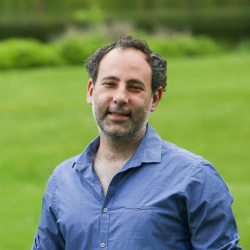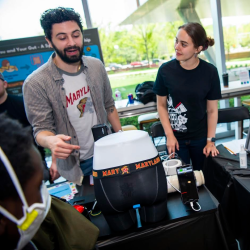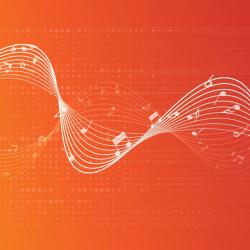Seven Science Terps Receive CMNS Alumni Network Summer Awards
The awards will enable the students to conduct research and present at scientific conferences over the summer
Every year, the College of Computer, Mathematical, and Natural Sciences (CMNS) Alumni Network offers summer awards to help undergraduates defray costs related to conducting research, attending conferences or interning.
Read below how this year’s award recipients plan to further their professional and career development with funding from the Undergraduate Summer Research, Travel, and Educational Enrichment Awards program.
Nada Abouelseoud

Junior neuroscience major Nada Abouelseoud will be studying the physiology of Alzheimer’s disease in Paul Worley’s lab at Johns Hopkins Medicine.
“This award from CMNS affords me the opportunity to immerse myself in uninterrupted summer research,” Abouelseoud said. “It also grants me the freedom to dedicate my undivided attention to my academic work throughout the semester.”
Without having to worry about financial concerns this summer, Abouelseoud is ready to invest her energy “wholeheartedly” in working toward her M.D./Ph.D. aspirations.
Emerson Hemley

Senior mathematics major Emerson Hemley is spending the summer working with Mathematics Professor Bill Goldman investigating the theory of algebraic stacks and moduli problems. In algebraic and arithmetic geometry, stacks provide a powerful framework for studying how mathematical objects can vary in families (known as moduli theory).
Hemley hopes to build this summer project into his senior thesis in Fall 2023. To prepare for this, he is learning more about algebraic geometry by attending the Graduate–Postdoc Week of the 2023 Thematic Program on Rationality and Hyperbolicity and a summer program on derived categories and moduli theory.
“I was especially thrilled to have been selected for this award since it made my attendance at these exciting programs possible,” Hemley said. “I am really looking forward to building on what I’ve started here at UMD.”
Daniel Klimes

Leishmaniasis—a parasitic disease found in parts of the tropics, subtropics and southern Europe—infects about 2 million people each year. In junior biochemistry major Daniel Klimes’ research with Cell Biology and Molecular Genetics Professor Najib El-Sayed, he studies the causative pathogen’s gene expression during the infection.
“We try to piece together exactly how it overcomes our immune system,” Klimes said. “My research involves taking existing gene expression datasets and comparing them between different species of the infecting parasite.”
This funding from CMNS will help Klimes commute to the lab from his home in Hagerstown, Maryland. He hopes this will help him make better progress and get hopefully impactful data.
“My mentor and I are really excited about where this research will lead,” Klimes said.
Riya Kumari

Senior computer science major Riya Kumari will be attending the 2023 International Conference on Robotics and Automation in London to present her research with the Perception and Robotics Group, led by Computer Science Professor Yiannis Aloimonos.
Kumari helped develop WorldGen—an open-source framework to autonomously generate countless structured and unstructured 3D photorealistic scenes such as city view, object collection and object fragmentation along with its rich ground truth annotation data.
“I am really looking forward to meeting other leading researchers in the field and seeing the latest advancements in the robotics and artifical intelligence fields,” Kumari said. “This award was an unexpected and pleasant surprise that will help me cover the costs of attending the conference, which I am extremely grateful for.”
Nicole Miko

To understand auditory perceptual learning at the neural level, senior biological sciences major Nicole Miko is working with Biology Assistant Professor Melissa Caras to study the role of neurons that project from the auditory cortex to the inferior colliculus in the auditory system.
In the auditory system, perceptual learning is displayed in language acquisition and musical skills. This kind of research is important for expanding understanding of the neural circuits that underlie sound processing—and it could also aid in the development of clinical interventions for the hearing-impaired.
“When I found out that I received this award, I felt pride, excitement, and relief,” Miko said. “I was excited to know that others see the value behind the research that I have been working on for the past few months and are excited to support it.”
Raina Morley

As a research assistant in Chemistry and Biochemistry Professor Amy Mullin’s lab, junior chemistry major Raina Morley uses time-resolved laser spectroscopy to investigate how energy is used in chemical processes and collisions at the molecular level.
Morley’s research combines pulsed laser spectroscopy and extremely high-resolution optical probes to prepare molecules in excited states and examine how that energy is dissipated through reactive and inelastic collisions.
“As a full-time student, it is difficult balancing my time between academics, research and work, as well as covering costs of travel to and from campus,” Morley said. “This award will help me be able to stay on campus to do my research throughout the summer, as well as contribute to travel costs to conferences.”
Arya Teymourlouei

Sophomore computer science major Arya Teymourlouei is working in the Neuromotor Control and Learning Laboratory to develop a computational model that classifies varying levels of mental workload.
Mental workload is the number of neural resources involved in completing a task. For example, Teymourlouei said, quiet daydreaming induces less mental workload than taking an exam under pressure.
“I am really looking forward to gaining a stronger understanding of the brain and cognitive processes,” Teymourlouei said. “Computational neuroscience is still a growing field today and we have much to understand. Hopefully, I can make a significant contribution—not just with this project, of course, but in the future too.”
Are you interested in supporting undergraduate students in their professional development and research activities? Consider donating to the CMNS Science Alumni Network Current Use Fund for Student Support.







